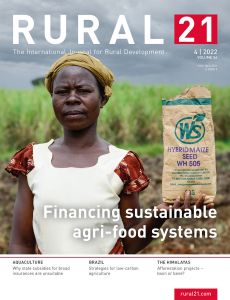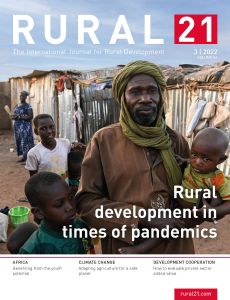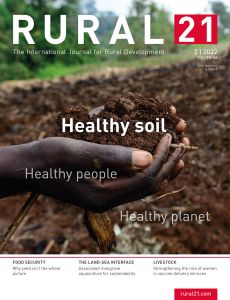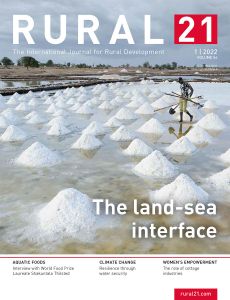Jahrgang 2022
-
Rural 21 (engl. Ausgabe 4/2022)
Focus 4/2022: Financing sustainable agri-food systems
Not only since the UN Food Systems Summit in September 2021 has the urgent need for a transformation of our agri-food systems been beyond question if SDG 2 – ending hunger and malnutrition in all its forms by 2030 – is not to get completely out of reach. However, the current world-wide bleak economic prospects are certainly not making the mobilisation of the resources this essentially requires any easier.
Alongside budget constraints, financial institutions sticking to their old patterns of behaviour are responsible for the urgently needed investments in the sustainable transformation of our agri-food systems having either failed to materialise or not being on target. Wrong incentives, not considering externalities in setting food and agricultural prices, lobbyism and not adequately prioritising the money available are further reasons. This edition shows you the approaches which science and development cooperation, financial institutions and the private sector regard as having proven promising in rebuilding our agri-food systems in line with the Agenda 2030 and making them resilient in the long term.
Erfahren Sie mehr -
Rural 21 (engl. Ausgabe 3/2022)
Focus 3/2022: Rural development in times of pandemics
For merely three years, the corona pandemic has held sway of our lives, with what are now more than 6.5 million deaths reported globally and millions of people who have fallen into poverty. Following the outbreak of the pandemic, the global economy fell into its deepest recession since World War II. Over 90 per cent of economies saw their gross domestic product fall, by a global average of 3.3 per cent in 2020.
Extensive macroeconomic relief measures helped the world economy to achieve a slight recovery in 2021. However, this positive trend has again been nullified by the impact of the Russian invasion of Ukraine. The World Bank estimates that global growth, still at 5.7 per cent in 2021, will have dropped to 2.9 per cent by the end of the year.
Even though we are not yet able to assess the long-term impacts of the pandemic today, insights so far paint a rather sobering picture. Existing social and economic inequalities have become further aggravated, and the world’s goal of ending hunger and poverty is getting further and further out of reach.
Erfahren Sie mehr -
Rural 21 (engl. Ausgabe 2/2022)
Focus 2/2022: Healthy soil – healthy people – healthy planet
We cannot live without healthy soil and land. It is on these resources that we produce most of our food and build our homes. We need them to provide clean water and precious plant nutrients, to conserve biological diversity and to cope with climate change. And they form the basis for the livelihoods of millions of people. But despite such known facts, these valuable resources are in a dire state. A third of all soils world-wide are already degraded, and each year, further huge expanses of fertile land go lost.
We know that the only way to reverse this trend is with a paradigm shift – away from a resource-intensive mode of production and towards a resource-friendly mode considering the planetary boundaries while placing our global agricultural and food systems on sustainable foundations. Our authors and interview partners share examples of global and national initiatives and policies as well as research insights and practical examples addressing this topic with you.
Erfahren Sie mehr -
Rural 21 (engl. Ausgabe 1/2022)
Focus 1/2022: Land-sea interactions
The increase in anthropogenic activities at the interface between land and sea is having a severe impact on coastal ecosystems and their services. And this is also affecting the livelihoods of coastal communities, which are already especially hard-hit by the effects of climate change. It is all the more important to find governance structures that consider the interdependencies between land and sea and allow proper management of possible externalities.
Erfahren Sie mehr






